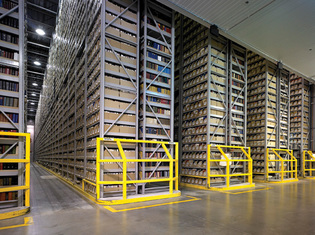
ReCAP
The Research Collections and Preservation Consortium operates a 200,000-square-foot storage facility in Princeton, New Jersey.
View full image
Rising in a suburban field planted with New Jersey native grasses and flowers, a building of nearly 200,000 square feet on Princeton University’s Forrestal campus houses one of the world’s largest library and archives preservation repositories. The Research Collections and Preservation Consortium (ReCAP) stores and circulates print, digital, and other materials to its member libraries and libraries worldwide through interlibrary loan. Founded in 2000 as a joint project of Columbia, Princeton, and the New York Public Library, ReCAP expanded to include Harvard in 2016. Now, the Yale University Library has joined the consortium.
Yale will contribute 2.7 million unique titles to ReCAP from its circulating collection of 15 million volumes, in return gaining access to the 8.8 million unique titles available from the other member libraries. “Yale Library is essential to furthering Yale’s mission, and I am thrilled that Yale will be helping to build one of the world’s best research collections with the goals of preservation and expanded access,” says university librarian Barbara Rockenbach. Membership also gives Yale access to ReCAP’s collaboratively managed repository, which holds over 18 million items.
To maximize storage capacity, items in ReCAP’s climate-controlled facility are housed on 30-foot-high shelving, organized not by author or topic, but by volume size. “The storage facility is a wonder,” says Daniel Dollar, Yale’s associate university librarian for scholarly resources, “with an inventory management system that allows most requests to be fulfilled rapidly and a storage environment that provides more than four times the longevity of conventional library stacks.”
Although ReCAP does hold non-circulating special collections materials, Yale plans to send only items from its general collections, maintaining local storage for special collections and archival materials.
Currently, ReCAP is delivering about 200,000 print items and 25,000 digital items annually, as well as making about 23,000 interlibrary loans. “The restrictions on travel during the Covid-19 lockdown really brought home the importance of being able to share collections through reliable delivery systems,” says Julie Linden, who recently retired as Yale’s special projects librarian.
Membership in the consortium also allows for strategic decisions about duplication of resources. ReCAP partner libraries make “retention commitments” for the print materials they share—formal agreements to keep certain items in perpetuity. “Each library knows what the others have committed to keeping,” says Linden, “so if one wanted to withdraw a certain book, they could check to see if others have a retention commitment to that book, informing the decision to withdraw, or replace any given title.”
Yale library staff expect materials from the other ReCAP institutions to be available through the Quicksearch tool to Yale users—faculty, staff, students, and alumni with library privileges—by the middle of next year. “If we do our job correctly,” says Ian Bogus, ReCAP’s executive director, “we should be invisible to library users. Our goal is to help our libraries keep materials accessible as long as they are needed. We collect and preserve resources not for the sake of collecting, but so they can be of the greatest use.”
 loading
loading
1 comment
-

Vincent Brannigan, 5:31am September 19 2025 |  Flag as inappropriate
Flag as inappropriate
The comment period has expired.The photo appears to show a fire disaster waiting to happen. Library materials need a sophisticated engineered fire protection system or they will all eventually be lost. I come from a library family, everything from local libraries to the library of Congress. Please do not talk about code compliance . Fire codes are not designed to protect rare material in any way shape or form
a description of the facility claims . "This close packing provides an additional level of environmental insulation, reduces oxygen exposure to guard against fire, and provides mechanical support to reduce physical strain on the collections"
https://recap.princeton.edu/facility-storage
This is fire safety nonsense
Vincent Brannigan
Professor Emeritus
Fire Protection Engineering
University of Maryland